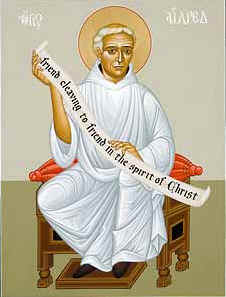Today we continue our regular series called “Learning from the Saints.” Our guide is expert Bert Ghezzi, a dear friend of mine and the author of numerous books including Voices of the Saints, Saints at Heart, and Discover Christ: Developing a Personal Relationship with Jesus.
His newest book is The Saints Devotional Bible, which illuminates the Scriptures with the saints’ own reflections. You can learn more about Bert and his work at BertGhezzi.com.
Today, Bert profiles St. Aelred of Rievaulx, a great example of fraternal love.
“How good and pleasant it is when brothers live together in unity!” – Psalm 133:1 (NIV)
 Although Aelred lived a millennium ago, his life and writings have a distinctively contemporary feel. An extremely competent administrator of a vast Yorkshire abbey, yet even more a spiritual father to hundreds of men, had we met Aelred we would identify him with Pope John XXIII or Cardinal Séan O’Malley, the archbishop of Boston. Like these beloved shepherds of the modern church, Aelred loved his flock and was much loved in return. “As I was walking around the cloisters,” he said, “all the brothers were sitting together. And in the whole throng I could not find one whom I did not love and by whom I was not loved.”
Although Aelred lived a millennium ago, his life and writings have a distinctively contemporary feel. An extremely competent administrator of a vast Yorkshire abbey, yet even more a spiritual father to hundreds of men, had we met Aelred we would identify him with Pope John XXIII or Cardinal Séan O’Malley, the archbishop of Boston. Like these beloved shepherds of the modern church, Aelred loved his flock and was much loved in return. “As I was walking around the cloisters,” he said, “all the brothers were sitting together. And in the whole throng I could not find one whom I did not love and by whom I was not loved.”
As a writer, too, Aelred seems to address our modern concerns and sensibilities. In his teaching that the interior life is communal—that we move from self and sin to find God in community—we might imagine we are hearing Henri J. M. Nouwen or Dorothy Day. Consider, for example, Aelred’s reflections on how spiritual friendship leads us to Christ:
“It is no small consolation in this life to have someone you can unite with you in an intimate affection and the embrace of a holy love. Someone in whom your spirit can rest, to whom you can pour out your soul, to whose pleasant exchanges, as to soothing songs, you can fly in sorrow. To the dear breast of whose friendship, amidst the many troubles of the world, you can safely retire. A person who can shed tears with you in your worries, be happy with you when things go well, search out with you the answers to your problems, whom with the ties of charity you can lead into the depths of your heart. A person who, though absent in body, is yet present in spirit, where heart to heart you can talk to him, where the sweetness of the Spirit flows between you, where you so join yourself and cleave to him that soul mingles with soul and two become one.
“And so praying to Christ for your friend, and longing to be heard by Christ for your friend’s sake, you reach out with devotion and desire to Christ himself. And suddenly and insensibly, as though touched by the gentleness of Christ close at hand, you begin to taste how sweet he is and to feel how lovely he is. Thus from that holy love with which you embrace your friend, you rise to that love by which you embrace Christ.”
From 1147 to 1167, Aelred governed 150 choir monks and 500 lay brothers at the Cistercian abbey at Rievaulx. He ruled firmly, but with kindness. In two decades he did not dismiss even one person from the monastery. Although constantly suffering from kidney stones, Aelred visited many other abbeys, extending his gentle influence throughout western monasticism. Encouraged by St. Bernard of Clairvaux, he wrote numerous books, including The Mirror of Charity and On Spiritual Friendship. For the last four years of his life, illness confined him to a cell attached to the abbey where small groups of monks daily sought his counsel. He died on January 12, 1167.
“I no longer call you servants, because a servant does not know his master’s business. Instead, I have called you friends, for everything that I learned from my Father I have made known to you. You did not choose me, but I chose you and appointed you to go and bear fruit—fruit that will last. This is my command: love each other.” – John 15:15-17 (NIV)
(Image Credit: English OP)
Read more from Bert at his website www.BertGhezzi.com, or check out his many books on Amazon.
 |
 |
 |
 |

